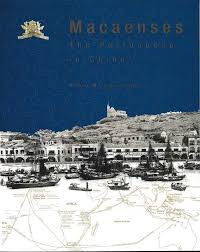 Author: António M. Jorge da Silva
Author: António M. Jorge da Silva
Publisher: 2015 by International Institute of Macua, Macau
ISBN: 9789993745853
Cost: $22.50 from Lusitano Club of California
In a vivid account that covers from the 1400s to the 1990s, António M. Jorge da Silva reveals the rich history of the descendants of the Portuguese of Macau
Reviews:
“In a vivid account that covers from the 1400s to the 1990s, António M. Jorge da Silva reveals the rich history of the descendants of the Portuguese of Macau. The evolution of them as a people – including their experiences in many parts of China, their resilience in a three-tier society, their loyalty to a country they had never seen, and their attempts to seek an identity they thought they had – offers a fresh perspective on the history of the Portuguese in East Asia. For those who are interested in the endless possibility of “global local fusion”, they should read Jorge da Silva’s book.”
Tse-ki Hon, PhD, Professsor of History – State University of New York of Geneseo
“This is a fascinating study of a tiny European colony on the coast of China and its Portuguese descendants, known as Macaenses. Setting the history of Macau into the broader picture of Portuguese colonialism, the author depicts in great deal the transforming relationships between the Macaenses, Chinese and British in the region over the centuries since the appearance of the Portuguese in the mid-sixteenth century. It is an extensively researched and well-written work and will appeal to anyone interested in the historical relationship between China and the outside world.”
Don Warren, Ph.D, Historian, Department of Oral History – University of California, Berkeley
“This fine work of Antonio M. Pacheco Jorge da Silva, an architect doubling as a historian, author of three fundamental pictorial histories about the Portuguese communities in Shanghai and Hong Kong has crested in his new book. In it he describes in details the evolution of the Macaense people and the longstanding debate in their identity. This is mandatory reading even for those who think they really know the facts on the Macaenses. It would be a pity if an edition in the Portuguese language does not follow this.”
Jorge Forjaz, Genealogist and Member of the Portuguese Academy of History
